- Home
- Elif Shafak
The Forty Rules of Love Page 4
The Forty Rules of Love Read online
Page 4
A minute later, when the serving boys lifted up the two customers, one of them had a broken finger and the other a broken nose, and there was blood all over. A fearful silence descended on the dining hall. Proud with the awe he’d inspired, the innkeeper gave me a sidelong look. When he spoke again, it sounded as if he were addressing everyone around, his voice soaring high and wild, like a marauder bird boasting in the open sky.
“You see, dervish, it wasn’t always like this. Violence wasn’t my element, but it is now. When God forgets about us down here, it falls upon us common people to toughen up and restore justice. So next time you talk to Him, you tell Him that. Let Him know that when He abandons his lambs, they won’t meekly wait to be slaughtered. They will turn into wolves.”
I shrugged as I motioned toward the door. “You are mistaken.”
“Am I wrong in saying I was a lamb once and have turned into a wolf?”
“No, you got that right. I can see that you have become a wolf indeed. But you are wrong in calling what you are doing ‘justice.’ ”
“Wait, I haven’t finished with you!” the innkeeper shouted behind my back. “You owe me. In return for food and bed, you were going to interpret my dreams.”
“I’ll do something better,” I suggested. “I’ll read your palm.”
I turned back and walked toward him, looking hard into his burning eyes. Instinctively, distrustfully, he flinched. Still, when I grabbed his right hand and turned his palm up, he didn’t push me away. I inspected the lines and found them deep, cracked, marking uneven paths. Bit by bit, the colors in his aura appeared to me: a rusty brown and a blue so pale as to be almost gray. His spiritual energy was hollowed out and thinned around the edges, as if it had no more strength to defend itself against the outside world. Deep inside, the man was no more alive than a wilting plant. To make up for the loss of his spiritual energy, he had doubled up his physical energy, which he used in excess.
My heart beat faster, for I had started seeing something. At first dimly, as if behind a veil, then with increasing clarity, a scene appeared in front of my eyes.
A young woman with chestnut hair, bare feet with black tattoos, and an embroidered red shawl draped over her shoulders.
“You have lost a loved one,” I said, and took his left palm in my hand.
Her breasts swollen with milk and her belly so huge it looks as if it could rip apart. She is stuck in a hut on fire. There are warriors around the house, riding horses with silver-gilded saddles. The thick smell of burning hay and human flesh. Mongol riders, their noses flat and wide, necks thick and short, and hearts as hard as rocks. The mighty army of Genghis Khan.
“You have lost two loved ones,” I corrected myself. “Your wife was pregnant with your first child.”
His eyebrows clamped down, his eyes fixed on his leather boots, and his lips tightly pursed, the innkeeper’s face creased into an unreadable map. Suddenly he looked old beyond his years.
“I realize that it’s no consolation to you, but I think there is something you should know,” I said. “It wasn’t the fire or the smoke that killed her. It was a wooden plank in the ceiling that collapsed on her head. She died instantly, without any pain. You always assumed she had suffered terribly, but in reality she did not suffer at all.”
The innkeeper furrowed his brow, bowed under a pressure only he could understand. His voice turned raspy as he asked, “How do you know all that?”
I ignored the question. “You have been blaming yourself for not giving her a proper funeral. You still see her in your dreams, crawling out of the pit she was buried in. But your mind is playing games with you. In truth, your wife and son are both fine, traveling in infinity, as free as a speck of light.”
I then added, measuring each word, “You can become a lamb again, because you still have it in you.”
Upon hearing this the innkeeper pulled his hand away, as if he had just touched a sizzling pan. “I don’t like you, dervish,” he said. “I’ll let you stay here tonight. But make sure you are gone early in the morning. I don’t want to see your face around here again.”
It was always like this. When you spoke the truth, they hated you. The more you talked about love, the more they hated you.
Ella
NORTHAMPTON, MAY 18, 2008
Bested by the tension that followed the argument with David and Jeannette, Ella was so drained she had to stop reading Sweet Blasphemy for a while. She felt as though the lid of a boiling cauldron had suddenly been lifted, emitting old conflicts and new resentments in the rising steam. Unfortunately, it was no one other than she who had lifted that lid. And she had done it by dialing Scott’s number and asking him not to marry her daughter.
Later in her life, she would deeply regret everything she’d uttered during this phone conversation. But on this day in May, she was so sure of herself and the ground beneath her feet that she could not for the life of her fathom any dire consequences from her intrusion.
“Hi, Scott. This is Jeannette’s mom, Ella,” she said, trying to sound jovial, as if calling her daughter’s boyfriend were something she did all the time. “Do you have a minute to talk?”
“Mrs. Rubinstein, how may I help you?” Scott stammered, surprised but ever so civilized.
And in a no-less-civilized tone, Ella told him that although she had nothing against him personally, he was too young and inexperienced to marry her daughter. Upset as he might be to receive this call now, she added, someday in the not-so-distant future he would understand and even thank her for warning him in time. Until then she asked him to kindly drop the subject of marriage and to keep this phone conversation between the two of them.
There was a thick, dense silence.
“Mrs. Rubinstein, I don’t think you understand,” Scott said when he finally found his voice. “Jeannette and I love each other.”
There it was again! How could people be naïve enough to expect love to open every door for them? They looked at love as if it were a magic wand that could fix everything with one miraculous touch.
But Ella didn’t say any of this. Instead she said, “I understand how you feel, believe me, I do. But you are too young and life is long. Who knows? Tomorrow you might fall in love with someone else.”
“Mrs. Rubinstein, I don’t want to be rude, but don’t you think the same rule applies to everyone, including yourself? Who knows? Tomorrow you, too, might fall in love with someone else.”
Ella chuckled, louder and longer than she intended.
“I’m a married woman. I’ve made a choice for a lifetime. So did my husband. And that’s exactly my point. Marriage is a serious decision, which needs to be considered very carefully.”
“Are you telling me not to marry your daughter, who I love, because I might love an unidentified other in an indefinite future?” Scott demanded.
The conversation went downhill from there, filled with distress and disappointment. When they finally hung up, Ella headed to the kitchen and did what she always did at times of emotional unrest: She cooked.
Half an hour later, she received a call from her husband.
“I can’t believe you called Scott to ask him not to marry our daughter. Tell me you didn’t do this.”
Ella gasped. “Wow, word gets out fast. Honey, let me explain.”
But David interjected tensely, “There is nothing to explain. What you did was wrong. Scott told Jeannette, and now she’s extremely upset. She’ll be staying with her friends for a few days. She doesn’t want to see you right now.” He paused briefly. “And I don’t blame her.”
That evening Jeannette wasn’t the only one who didn’t come home. David sent Ella a text message informing her of a sudden emergency that had arisen. There was no explanation as to the nature of the emergency.
It was so unlike him and against the spirit of their marriage. He might flirt with woman after woman, could even sleep with them and spend his money on them for all she knew, but he had always come home and taken his place at the t
able in the evenings. No matter how deep the rift between them, she always cooked and he always ate, gladly and gratefully, whatever she put on his plate. At the end of each dinner, David never failed to thank her—a heartfelt thank-you that she always took to be a coded apology for his infidelities. She forgave him. She always did.
This was the first time her husband had acted this brazen, and Ella blamed herself for the change. But then again, “guilt” was Ella Rubinstein’s middle name.
When she sat at the table with her twins, Ella’s guilt gave way to melancholy. She resisted Avi’s pleas to order pizza and Orly’s attempts not to eat anything, forcing them to munch on wild rice with green peas and roast beef with mustard glaze. And although on the surface she was the same hands-on, concerned mother, she felt a surge of despair rise in her, a sharp taste in her mouth, sour like bile.
When dinner was over, Ella sat at the kitchen table on her own, finding the stillness around her heavy and unsettling. Suddenly the food she had cooked, the outcome of hours of hard work, seemed not only dull and boring but easily replaceable. She felt sorry for herself. It was a pity that, at almost forty, she hadn’t been able to make more of her life. She had so much love to give and yet no one demanding it.
Her thoughts turned to Sweet Blasphemy. She was intrigued by the character of Shams of Tabriz.
“It could be nice to have someone like him around,” she joked to herself. “Never a dull day with a guy like him!”
And somehow the image that popped up in her mind was of a tall, dark-looking, mysterious man with leather pants, a motorcycle jacket, and black hair that fell to his shoulders, riding a shiny red Harley-Davidson with multicolored tassels hanging from the handlebars. She smiled at the image. A handsome, sexy, Sufi motorcyclist riding fast on an empty highway! Wouldn’t it be nice to get picked up while hitchhiking by a guy like that?
Ella then wondered what Shams would see if he read her palm. Would he explain to her why her mind turned from time to time into a coven of dark thoughts? Or how come she felt so lonely even though she had a large, loving family? What about the colors in her aura? Were they bright and bold? Had anything in her life been bright and bold lately? Or ever?
It was then and there, while sitting alone at the kitchen table with only a faint glimmer of light from the oven, that Ella realized that despite her high-flying words denying it, and despite her ability to keep a stiff upper lip, deep inside she longed for love.
Shams
AN INN OUTSIDE SAMARKAND, MARCH 1242
Burdened with loneliness, all fast asleep in separate dreams, were more than a dozen weary travelers upstairs at the inn. I stepped over bare feet and hands to reach my empty bedroll that reeked of sweat and mold. I lay there in the dark, mulling over the day’s events and reflecting on any divine signs I might have witnessed but, in my haste or ignorance, failed to appreciate.
Since I was a boy, I had received visions and heard voices. I always talked to God, and He always responded. Some days I ascended all the way up to the seventh sky as light as a whisper. Then I descended into the deepest pits of the earth, suffused with the smells of soil, hidden away like a rock buried under mighty oaks and sweet chestnuts. Every so often I lost my appetite for food and went without eating for days on end. None of these things scared me, though in time I had learned not to mention them to others. Human beings tended to disparage what they couldn’t comprehend. I had learned that firsthand.
The first person to misjudge my visions was my father. I must have been ten years old when I started seeing my guardian angel on a daily basis and was naïve enough to think that everyone else did as well. One day, while my father was teaching me how to build a cedar chest so that I could become a carpenter like him, I told him about my guardian angel.
“You have a wild imagination, son,” my father said dryly. “And you better keep it to yourself. We don’t want to upset the villagers again.”
A few days before, the neighbors had complained about me to my parents, accusing me of acting strange and scaring their kids.
“I don’t understand your ways, my son. Why can’t you accept that you are no more remarkable than your parents?” my father asked. “Every child takes after his father and mother. So have you.”
That was when I realized that although I loved my parents and craved their love, they were strangers to me.
“Father, I am from a different egg than your other children. Think of me as a duckling raised by hens. I am not a domestic bird destined to spend his life in a chicken coop. The water that scares you rejuvenates me. For unlike you I can swim, and swim I shall. The ocean is my homeland. If you are with me, come to the ocean. If not, stop interfering with me and go back to the chicken coop.”
My father’s eyes grew large, then small and distant. “If this is the way you talk to your father now,” he said gravely, “I wonder how you will address your enemies when you grow up.”
Much to the chagrin of my parents, the visions did not disappear as I got older. If anything, they became more intense and gripping. I knew I made my parents nervous, and I felt guilty for upsetting them so, but the truth is, I didn’t know how to end the visions, and even if I had, I don’t think I would have. Before long I left my house for good. Since then Tabriz has become a smooth, sweet word, so fine and delicate that it melts on my tongue. Three scents accompany my memories of this place: cut wood, poppy-seed bread, and the soft, crisp smell of snow.
I have been a wandering dervish ever since, not sleeping in the same place more than once, not eating out of the same bowl twice in a row, every day seeing different faces around me. When hungry, I earn a few coins by interpreting dreams. In this state I roam east and west, searching for God high and low. I hunt everywhere for a life worth living and a knowledge worth knowing. Having roots nowhere, I have everywhere to go.
During my travels I have taken all sorts of roads, from popular trade routes to forgotten tracks where you wouldn’t run into a soul for days on end. From the coasts of the Black Sea to the cities of Persia, from the vast steppes of Central Asia to the sand dunes of Arabia, I have passed through thick forests, flat grasslands, and deserts; sojourned at caravansaries and hostels; consulted with the learned men in age-old libraries; listened to tutors teaching little children in maktabs; discussed tafsir and logic with students in madrassas; visited temples, monasteries, and shrines; meditated with hermits in their caves; performed zikr with dervishes; fasted with sages and dined with heretics; danced with shamans under the full moon; come to know people of all faiths, ages, and professions; and witnessed misfortunes and miracles alike.
I have seen poverty-stricken villages, fields blackened by fire, and plundered towns where the rivers ran red and there were no men left alive above the age of ten. I have seen the worst and the best in humanity. Nothing surprises me anymore.
As I went through all these experiences, I began to compile a list that wasn’t written down in any book, only inscribed in my soul. This personal list I called The Basic Principles of the Itinerant Mystics of Islam. To me these were as universal, dependable, and invariable as the laws of nature. Together they constituted The Forty Rules of the Religion of Love, which could be attained through love and love only. And one of those rules said, The Path to the Truth is a labor of the heart, not of the head. Make your heart your primary guide! Not your mind. Meet, challenge, and ultimately prevail over your nafs with your heart. Knowing your ego will lead you to the knowledge of God.
It had taken me years to finish working on these rules. All forty of them. And now that I was done, I knew I was nearing the final stage of my time in this world. Lately I had been having many visions in this direction. It wasn’t death that worried me, for I didn’t see it as an end, but dying without leaving a legacy behind. There were many words piled up inside my chest, stories waiting to be told. I wanted to hand all this knowledge to one other person, neither a master nor a disciple. I sought an equal—a companion.
“God,” I whispered into th
e dark, damp room, “all my life I traveled the world and followed Thy path. I saw every person as an open book, a walking Qur’an. I stayed away from the ivory towers of scholars, preferring to spend time with outcasts, expatriates, and exiles. Now I am bursting. Help me to hand Thy wisdom to the right person. Then Thou can do with me as Thou wish.”
Before my eyes the room was showered with a light so bright that the faces of the travelers in their beds turned lurid blue. The air inside smelled fresh and alive, as if all the windows had been pushed open and a gusty wind brought in the scent of lilies and jasmine from faraway gardens.
“Go to Baghdad,” fluted my guardian angel in a singsong voice.
“What is awaiting me in Baghdad?” I asked.
“You prayed for a companion, and a companion you will be given. In Baghdad you will find the master who will point you in the right direction.”
Tears of gratitude welled up in my eyes. Now I knew that the man in my vision was no other than my spiritual companion. Sooner or later we were destined to meet. And when we did, I would learn why his kind hazel eyes were eternally sad and how I came to be murdered on an early-spring night.
Ella
NORTHAMPTON, MAY 19, 2008
Before the sun had set and the children had come back home, Ella placed a bookmark in the manuscript and put Sweet Blasphemy aside. Curious about the man who had written the novel, she went online and Googled “A. Z. Zahara,” wondering what would pop up but not expecting much.
To her surprise, a personal blog appeared. The colors on the page were predominantly amethyst and turquoise, and on top of the page a male figure with a long white skirt whirled slowly. Having never seen a whirling dervish before, Ella took a careful look at the picture. The blog was titled An Eggshell Named Life, and beneath it there was a poem with the same title:

 Black Milk: On Writing, Motherhood, and the Harem Within
Black Milk: On Writing, Motherhood, and the Harem Within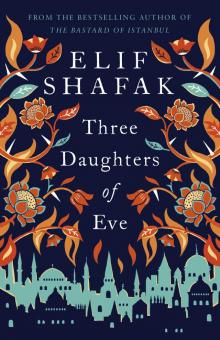 Three Daughters of Eve
Three Daughters of Eve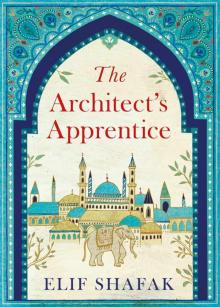 The Architect's Apprentice
The Architect's Apprentice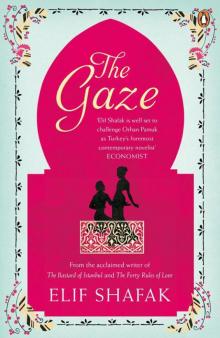 The Gaze
The Gaze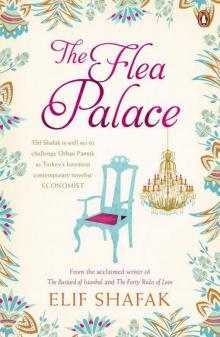 The Flea Palace
The Flea Palace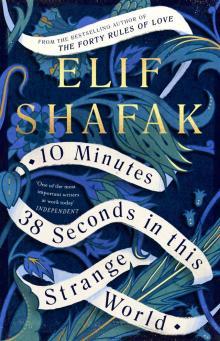 10 Minutes 38 Seconds in this Strange World
10 Minutes 38 Seconds in this Strange World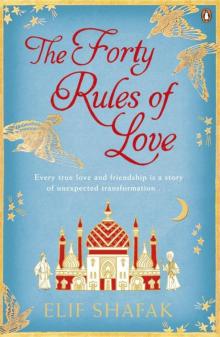 The Forty Rules of Love
The Forty Rules of Love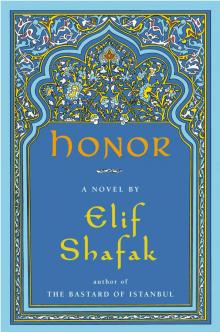 Honor
Honor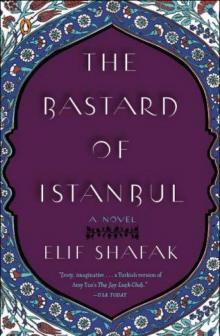 The Bastard of Istanbul
The Bastard of Istanbul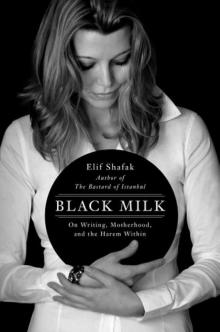 Black Milk
Black Milk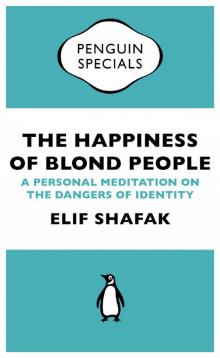 The Happiness of Blond People (Penguin Specials)
The Happiness of Blond People (Penguin Specials)